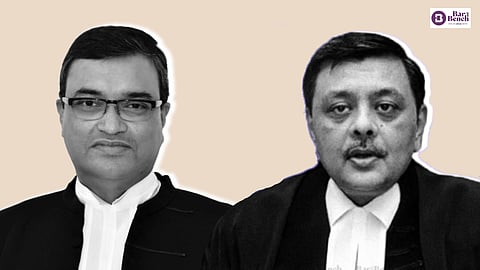
- Latest Legal News
- News
- Dealstreet
- Viewpoint
- Columns
- Interviews
- Law School
- Legal Jobs
- हिंदी
- ಕನ್ನಡ

Several organisations and activists have written to Chief Justice Dipankar Datta and Justice Gautam Patel of the Bombay High Court seeking withdrawal of the guidelines recently issued by the latter to protect the identities of parties in proceedings under the Sexual Harassment of Women at the Workplace (Prevention, Prohibition and Redressal) Act, 2013 (POSH Act) and Rules last month.
“The Order will not only silence women but will also have a chilling effect on the media and society at large in speaking up against perpetrators of sexual violence and harassment,” read the representation urging the Court to reconsider the guidelines.
In his order dated September 24, Justice Patel had set out a working protocol to govern hearings and case file management to protect the identities of parties from even accidental disclosure in proceedings under the Act. Some of the guidelines were:
No personally identifiable information is to be retained by the Registry when any document is filed;
For verification of identity, the Registry is to ask for production of an identity document, but no copy of any such document is to be retained;
Titles are to be anonymised in all further affidavits or documents by the parties;
Order sheets not to have names of parties or witnesses, neither in titles nor in body of the order;
Orders/judgments on merits will not be uploaded;
Parties, advocates are forbidden from disclosing the contents of any order, judgment or filing to the media or publishing any such material in any mode or fashion by any means, including social media, without specific leave of the court;
The prohibition on publishing the names, address or other personal information of the parties is absolute;
Any breach of the guidelines by any person, including media, will be considered contempt of court.
The representation expressed surprise at the guidelines, particularly since they came at a time when powerful men still stifle women’s voices through gag orders.
“The order of the Court will invariably strengthen the hands of large corporates and their powerful men to protect dominant perpetrators of sexual harassment from scrutiny and legitimate public comment.”
The activists have also expressed fear at the possibility of a ripple effect this order may have in matters dealing with other sexual offences unconnected to this Act.
Importantly, it was pointed out that the guidelines rob survivors of their agency by taking away their choice and freedom of expression.
“Preventing a woman from speaking of the violence she underwent, also gags those others who would have gathered courage to voice what they underwent and stand in solidarity and support of survivor in her struggle for justice.”
It is also stated that under Section 228A of the Indian Penal Code, a survivor of sexual assault has the choice to let her identity be known in the public domain. This order, it is highlighted, denies survivors even that right and takes away their agency.
Further, the guidelines faced criticism on the grounds that they not only prevent disclosure of identities, but prohibit the media from discussing any part of the proceedings.
“Transparency and accountability are the bedrock of a just and fair system. This order only increases the already existing opacity of a judicial system that seems to be stacked against survivors of sexual violence. Justice must not only be done but must also be seen to be done.”
The letter concludes,
"We are of the strong opinion that these guidelines are excessive, hinder public access to judgements, create opacity around judiciary and overburden the proceedings under the POSH Act, and are thus, counterproductive to the objective of ensuring minimum delays and a speedy access to justice devised by the POSH Act. The Order will not only silence women but will also have a chilling effect on the media and society at large in speaking up against perpetrators of sexual violence and harassment."